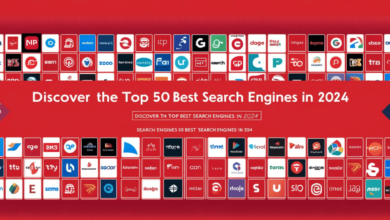In an era of growing concern over data privacy and
algorithmic biases, search term “what is the most conservative search
engines” has gained momentum. Users want platforms that are consistent with
their values, ensuring privacy, reliability, and a lack of ideological bias.
This comprehensive guide walks through the landscape of conservative search
engines, exploring their features, privacy policies, and underlying ideologies.
Features of most conservative search engines:
Conservative search engines prioritize user privacy,
provide robust filtering options, and present search results devoid of
ideological bias. These platforms often include the following features:
Read: Unleash Your Brand’s Potential: Digital Marketing for Awareness Growth
Advanced Privacy Measures:
Advanced encryption technology and minimal data collection ensure user
anonymity and protect sensitive information.
Customizable filters: Users
can customize search results based on their preferences, filtering out content
that contradicts their beliefs or values.
Ad-free experience: By
minimizing ads, conservative search engines prioritize the relevance of content
over commercial interests.
Privacy & Ideology of conservative search engine:
Privacy is often a significant concern for users of most conservative search engines. These platforms prioritize user privacy by
minimizing data collection and implementing robust encryption protocols to
protect user information. Ideologically, conservative search engines may
promote traditional values, prioritize family-friendly content, and avoid algorithms that prioritize sensationalism or politically biased content.
Top 3 Conservative Search Engines and Their Benefits
1. Conservapedia Search:
Geared toward conservative
users, Conservapedia Search offers a comprehensive index of
conservative-leaning content. Its benefits include:
– Curated search
results are consistent with conservative principles.
– Minimal data
collection, prioritizing user privacy.
– Powerful
filtering options to customize search experiences.
2. DuckDuckGo:
While not explicitly conservative,
DuckDuckGo prioritizes user privacy and neutrality in search results. Its
benefits include:
– Strict privacy
policies, ensuring user anonymity.
– Lack of tracking
mechanisms and personalized ads.
– Neutrality in
search results, minimizing ideological bias.
3. Brave Search:
Developed by the creators of Brave
Browser, Brave Search emphasizes user privacy and transparency. Its benefits
include:
– Decentralized
indexing minimizes centralized control over search results.
– Privacy-focused
features, like anonymous search options and data encryption.
– Commitment to
neutrality, presenting diverse viewpoints without ideological bias.
Conclusion:
In conclusion, the choice of the most conservative search
engine depends on personal preferences regarding features, privacy, and
ideology. By understanding each platform’s unique offerings, users can make
informed decisions to find the search engine that best suits their needs and
values.
FAQ
Q: Are conservative search engines completely free of bias?
A: While conservative search engines strive for neutrality,
complete elimination of bias is challenging. Users should critically evaluate
search results and cross-reference information from multiple sources.
Q: How do conservative search engines prioritize privacy?
A: Conservative search engines prioritize privacy through
minimal data collection, encryption technologies, and transparent privacy
policies. These measures are intended to protect user data from unauthorized
access or misuse.
Q: Can I use conservative search engines alongside
mainstream platforms?
A: Yes, many users choose to use conservative search
engines along with mainstream platforms to access a variety of viewpoints.
However, caution and critical thinking are necessary when obtaining information
from any source.
Also Read :
Debunking the Myth: Is SEO a Waste of Money?
Google Unusual Traffic iPhone Understanding : Caught on Web
Exploring JVZoo vs ClickBank: Which Platform Offers the Best Opportunities for Affiliates?




